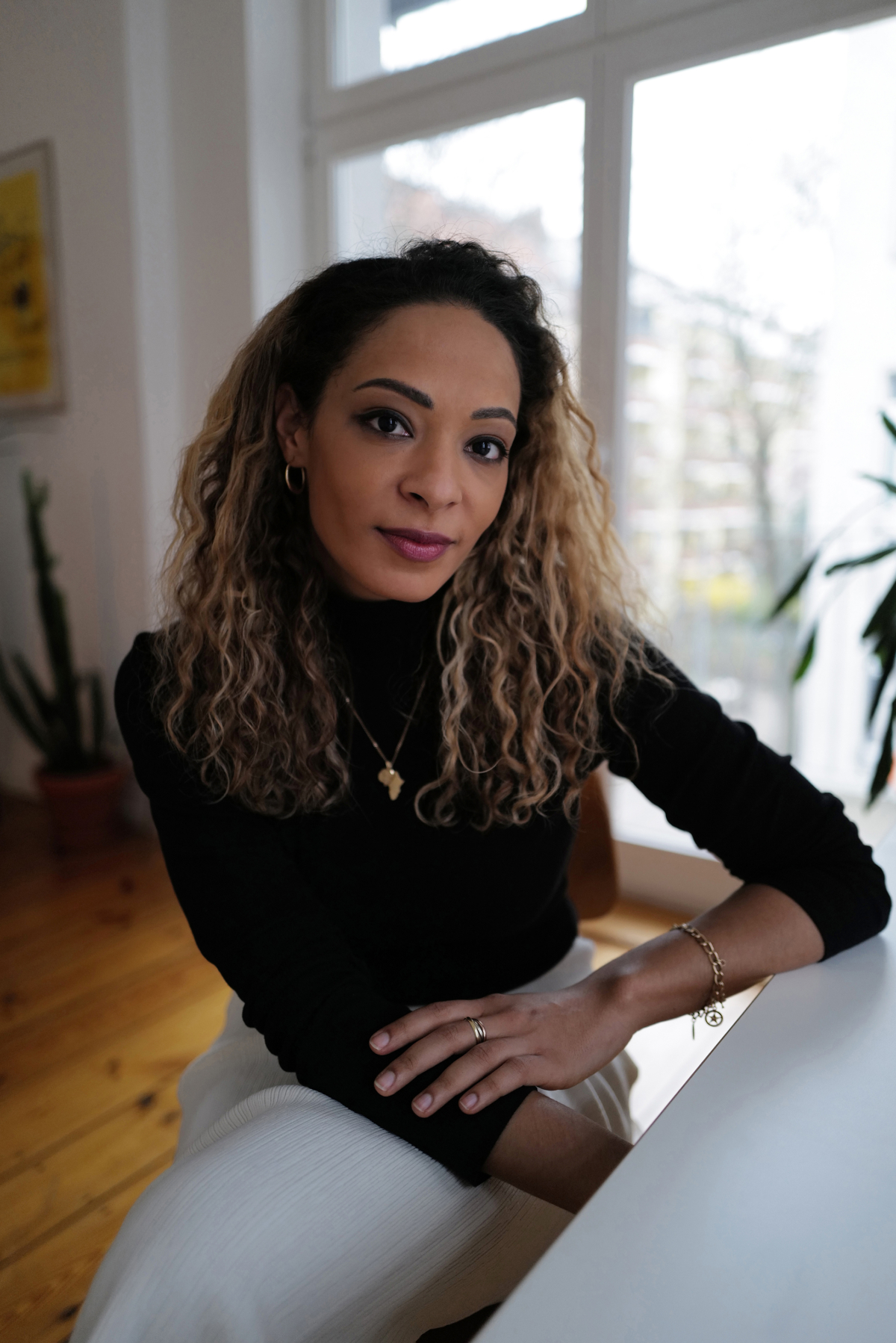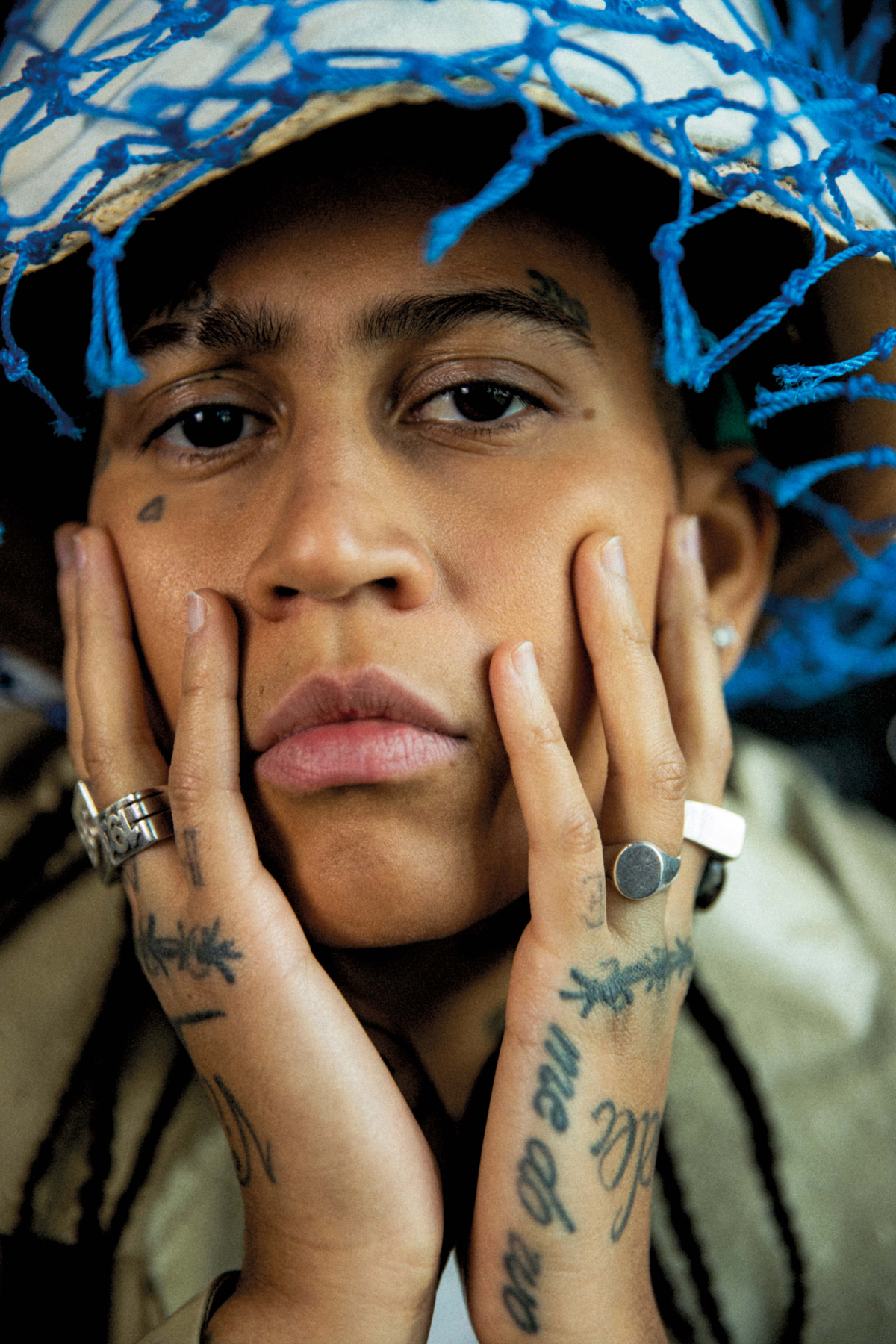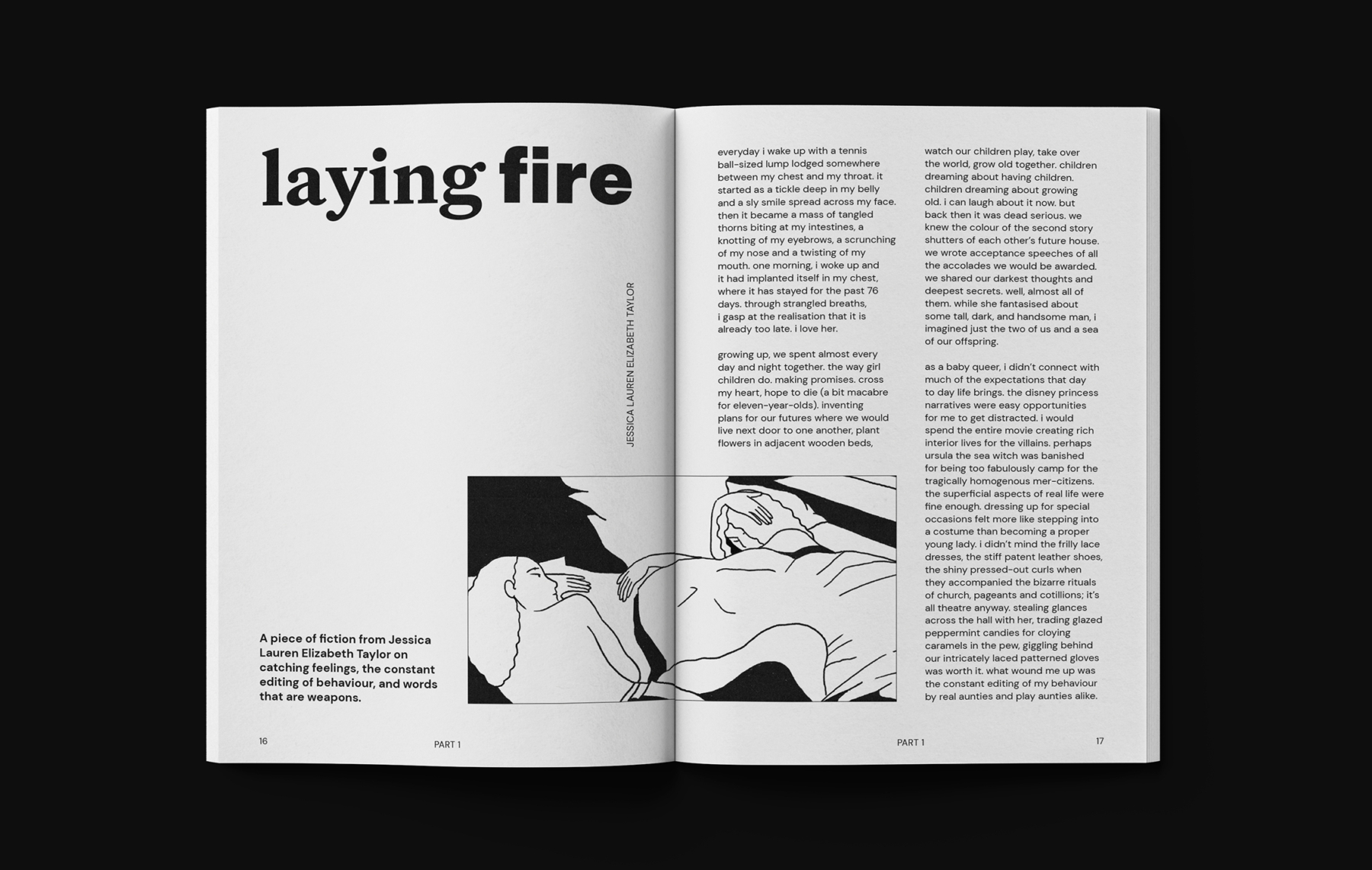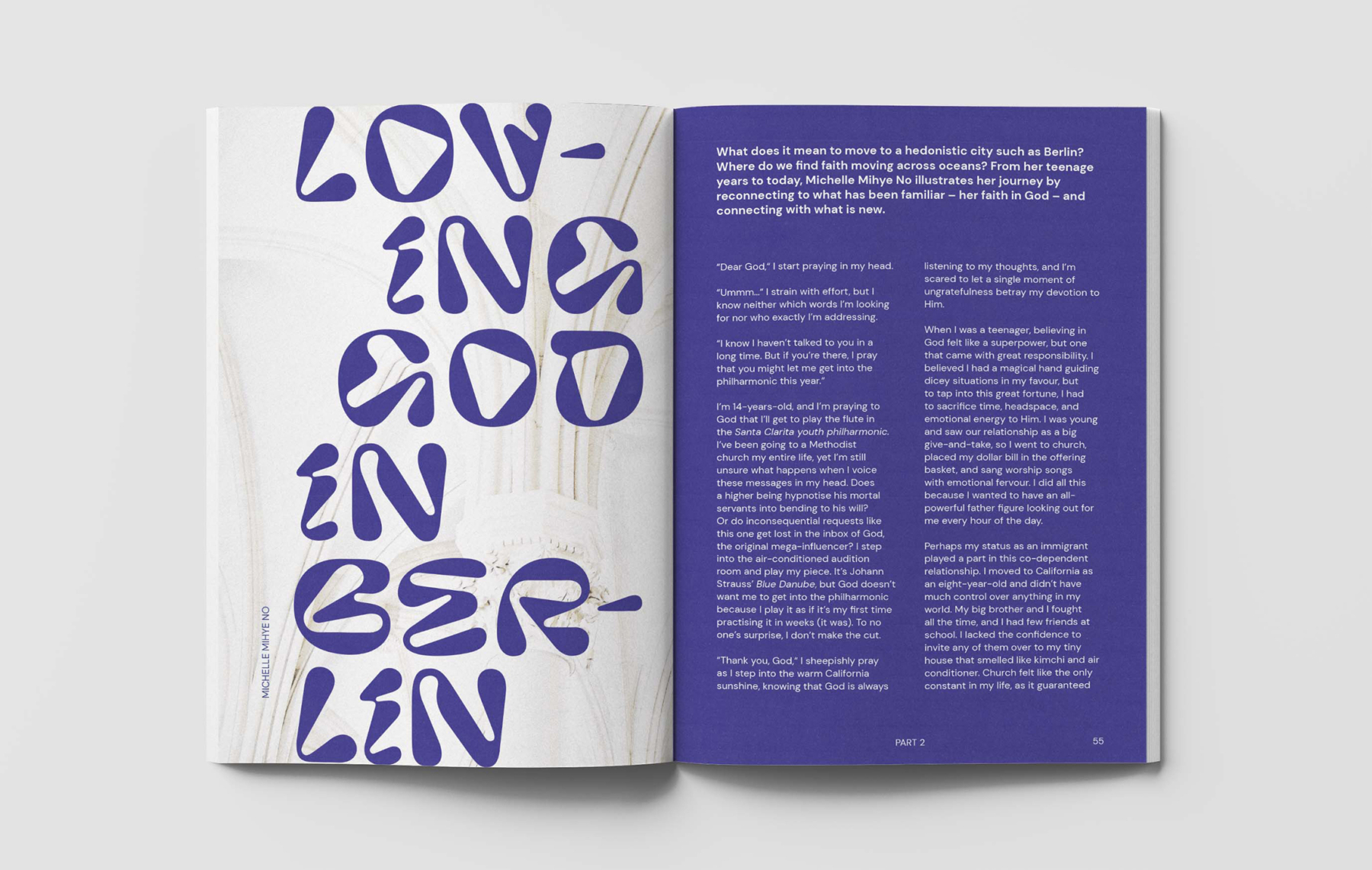The founder and the guest editor of Berlin-based DADDY magazine unpack the role of independent publishing in advancing a more inclusive mediascape.
In a mediascape that often feels homogeneous and conditioned by the logic of immediacy, (independent) printed magazines constitute a valuable space for slowing down and bringing attention to underrepresented topics and voices.
Sensitive to these possibilities, journalist and content strategist Kemi Fatoba founded DADDY, a platform where people of color, queer people, and trans people could take control of their own narratives and tackle critical issues (such as racism, sexism, and homophobia) through a creative, first-hand perspective. Like most independent endeavors, the project launched online as a “passion project on a shoestring budget.” As of 2020, however, DADDY also exists on paper and has grown into an all-round publishing platform and consultancy that goes well beyond its early-day ambitions.
The latest installment of DADDY’s annual print magazine, ‘Dreams’, speaks clearly to this development and was realized in collaboration with guest editor Thị Minh Huyền Nguyễn—Vietnamese writer, athlete, and activist—, guest designer Seine Kongurangkit—Thailandese art director and audiovisual artist—, and DADDY‘s own art director Elise Chastel. Through a variety of creative essays, interviews, and visual contributions, the issue explores the practice of dreaming as a way of better understanding personal and shared realities, nurturing our imagination, and envisioning better futures.
We spoke to Fatoba and Nguyễn about turning this dream issue into reality, the power of print, and the significance of independent publishing in the fight against discrimination and tokenism.

-
In what ways did your background and interests shape the vision behind DADDY magazine?
Fatoba: I’ve got a background in journalism and always had a lot of freedom when it came to expressing myself—as long as I stayed clear of topics that were considered too niche. This meant that the conversations I had with my friends, who are Black, of colour, and/or queer and part of this perceived niche were rarely reflected in magazines. If they were, it usually happened during special occasions such as Pride or Black History Month. For a long time, I thought: That’s what journalism is like, so maybe it’s not the right thing for me. I lost interest in writing about things that had nothing to do with my life and worked in advertising and events for a bit until I found my way back to writing. The media landscape was and is incredibly elitist and homogenous, and when we launched the online magazine five years ago, we wanted to create a space for those who are underrepresented in mainstream media. We wanted to take control of our own narrative rather than letting others write about us. We wanted to be unapologetic and free ourselves from the white gaze, male gaze, or heteronormative gaze and create a platform for our communities. That’s what still sets up apart from many other publications and platforms: We are part of the communities we cater to. They matter to us every month and every day, and not just when it’s trending.
-
In your latest issue, the ‘Dreams’ issue, you passed the mic to editor Thị Minh Huyền Nguyễn and art director Seine Kongruangkit. How did you meet and what inspired this decision?
Fatoba: Huyền was one of the contributors to our first issue, ‘Together’. She pitched a piece to us titled “Using Science Fiction to imagine new BIPOC Futures”. I loved it because it covered her upbringing in a Vietnamese household, female scholars and authors of color, and her activism. After we decided to make ‘Dreams’ the central theme of the next issue, she was the first person who came to my mind and so I asked her if she’d like to be our guest editor. Seine Kongruangkit is friends with our art director, Elise Chastel, who suggested involving her. Huyen wanted to focus on stories from the Asian diaspora and as such, it made sense to work with a guest art director who she shared a cultural understanding with.
Nguyễn: Kemi reached out to me in February ‘21 after I had contributed to the first print issue in 2020, and after our phone call, I felt honored and inspired to co-create the second print issue on “Dreams” with her. This topic has been on my mind for a while now and funnily enough, working on a magazine has been a childhood dream of mine. It was a perfect match!
-
Among other things, ‘Dreams’ brings attention to the importance of “retreating instead of reacting” and to the significance of dreaming for imagining new futures. Why are these notions so important right now?
Nguyễn: Over the past years, I felt like a lot of my friends and community members have been fighting against something. Be it racism at work, classism in education or sexism on the street. The everyday struggle is real as a marginalized person and I don’t want to take anything away from that, but when each day feels like a fight, I wonder at times, what it’s like to rest, to retreat, to sleep and to allow ourselves to dream and build again? Just the other day, a friend reminded me of what the great writer Toni Morrison once said: “The function, the very serious function of racism is distraction. It keeps you from doing your work.” And I truly believe that it also keeps you from dreaming and creating the stories and the art you want to see.
-
Knowing what you know about publishing and community, could you tell us a little bit about the role of independent publications in relation to critical discourse and resistance?
Fatoba: This will make me sound ancient but I think in many ways independent publishing replaced what underground zines and niche magazines used to be before the internet. These days, a lot of magazines feel a bit “samey” because they have to appeal to a wide audience. When I flick through them, I hardly ever read something that’s innovative, subversive, or just really out there. I remember going to the newsagents to pick up magazines as a teen and being blown away by their randomness. Back then, there were a lot more niche publications about street style, music, and subcultures and when they were gone, they were gone. There was no way of getting this kind of curated content elsewhere and luckily I held on to some of them because they were special back then, and still are today. Most of these publications don’t exist anymore but when I pick up indie magazines today, I still get this feeling of reading something new and unique because they have to be different in order to survive. Often, there’s less rush to produce them and you can tell that the people who are involved put a lot of effort into telling stories they really care about. Indie magazines feel more like a labor of love. It takes a lot of idealism, patience and money to launch them and I admire everyone who is bold enough to do it.


-
When it comes to amplifying the voices of underrepresented individuals and communities, what distinguishes the space of a blog/online platform from the space of a zine/printed magazine? What motivated your decision to print?
Fatoba: We started out as an online magazine and it was fun because as we grew, we realized how far we reached. It was exciting because DADDY started out as a passion project on a shoestring budget and everyone involved was happy to invest their time and energy because we believed that the platform was needed. The thing with online content is that people expect it to be free, which made DADDY unsustainable, and that’s part of the reason why we decided to shift to print. We wanted to honor the people who worked for us, compensate them, and create something people are happy to invest in and enjoy at home. In the print magazine, you’ll find less bite-sized content and more long reads because we have more time to develop ideas. Our designers and illustrators also have more time to create stunning visuals. The amount of work that went into our print issues is crazy but nothing compares to the feeling when you finally hold it in your hands.
“Indie magazines feel more like a labor of love. It takes a lot of idealism, patience and money to launch them and I admire everyone who is bold enough to do it.”
-
What do you take to be the biggest challenges facing independent publishing today? What needs to change?
Nguyễn: I think one of the biggest challenges is competing with the sense of instant gratification. Specifically with the flood of information on social media and online publishing. You can easily get distracted. However, I do have hope that there is a return to print as we saw with the increase in purchase numbers of books over the years. In this pandemic, people were forced to slow down and I think they started to appreciate turning off the screen. I also believe an annual printing schedule makes the most sense for a dense magazine like DADDY.
Fatoba: It’s a shame that publishing is so elitist, expensive, and wasteful. Visibility is incredibly important in the industry and in order to get it, publishers need good connections. They also have to be okay with a portion of their magazines being thrown away when they don’t sell, as returning them doesn’t make sense economically. We’re printing the magazine in Berlin but Covid made everything more expensive, including the price of paper. Suddenly we’re paying a third more for everything, which is a lot for a small business. There are so many factors that make it hard to thrive as an independent publisher and if it wasn’t for our consultancy, which funds the magazine, we wouldn’t be able to run it. Luckily our community always shows up for us too. Over the last five years, they have come to our events and supported us in many ways, be it financially or by spreading the word about us. They really believe in our mission, which means the world to us because they are the reason why we started DADDY in the first place.


-
Thinking of your experience, what changes would you like to see in Berlin’s creative industry?
Nguyễn: I would love to see more BIPOC* creatives, especially Black and women of color get hired and paid. Not only that, I would love for more people to invest in our ideas and dreams long-term, like putting funding behind us and providing financial opportunities.
Fatoba: I am so tired of performative representation, pigeonholing, and tokenism. Instead, I’d like to see real change in the boardrooms and behind closed doors where decisions are made. I know that these changes don’t happen overnight but after all these years of talking about diversity and inclusion, it would be so nice to see real action that goes beyond the surface level.
-
So far, what is your biggest takeaway from curating the various online and offline spaces occupied by DADDY? Do you have any recommendations for people looking to embark on independent editorial projects?
Nguyễn: Have a vision, lots of endurance and overall, have fun with it. At the end of the day, create spaces for your friends and loved ones, create meaningful content and be joyful while doing it. I know it is easier said than done, but hopefully you’ll find peers who you can create new online and offline spaces with.
Fatoba: Do it! If you have talent and a clear vision, don’t let anyone hold you back. Starting a publication is exciting, sometimes also scary but ultimately always worth it. I’ve met some of my greatest friends through DADDY and it never ceases to amaze me how many talented people we get to work with.
Friends of Friends talks to DADDY magazine founder Kemi Fatoba and guest-editor Thị Minh Huyền Nguyễn about their latest print issue ‘Dreams,’ and the role of printing in reclaiming space for marginalized cultural discourse. Fatoba is also an early FF collaborator and we couldn’t be more thrilled to see her accomplish such timely and inspiring work.
Founded in 2016, DADDY is an independent publishing platform and annually printed magazine centered in diversity, inclusion, and intersectionality. Its latest print issue is dedicated to the practice of dreaming and was co-edited by guest editor Thị Minh Huyền Nguyễ, designer Seine Kongurangkit, and art director Elise Chastel. To learn more about DADDY, be sure to visit its online platform and get your hands on the latest print issue. For all other updates follow DADDY’s Instagram.
Interview: Amelie Varzi
Photography: courtesy of Meklit Fekadu, Greta Graf, Danilo Sierra and Le Quyen Nguyen








